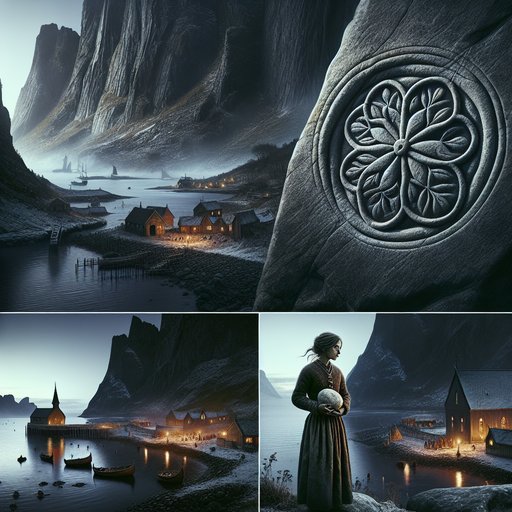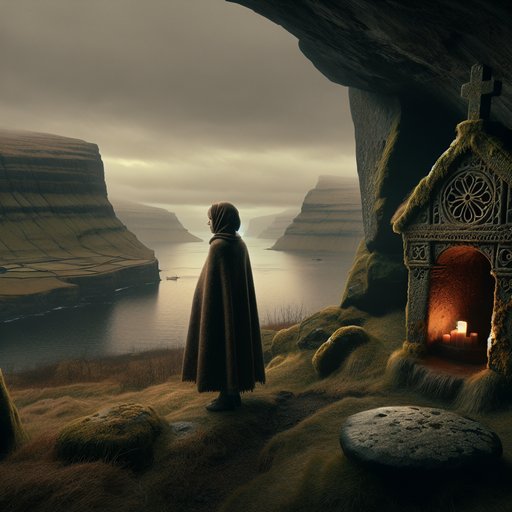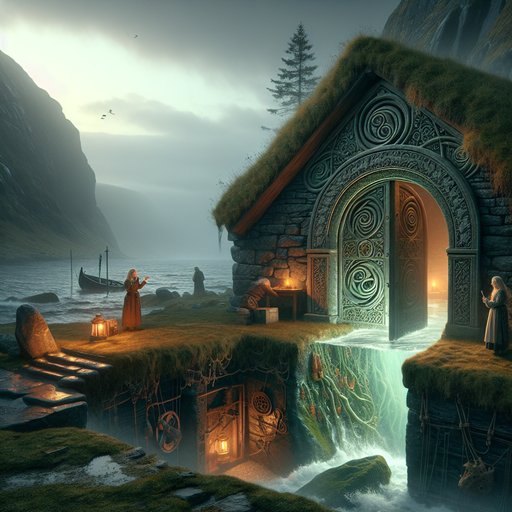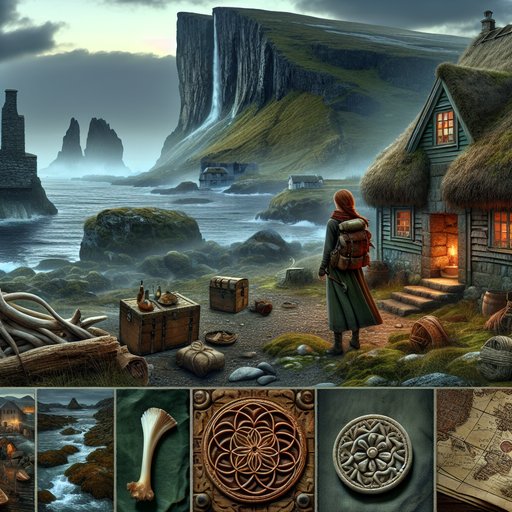CHAPTER 6 - The Quiet Gate Beneath the Singing Valley
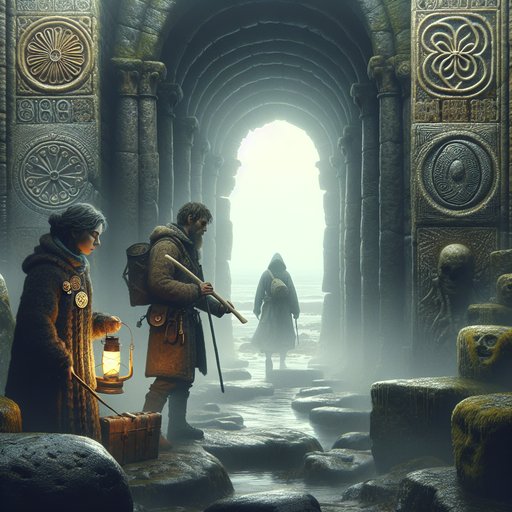
Barbra chooses to press on with unexpected allies as the iron-bound door beneath Saksun pulses open. Guided by Sigrið, the elderly woman with the rosette brooch, and Kári, the fisherman who once warned her off, she descends into a resonant warren where the hum of the fjord is revealed to be a deliberate decoy. The families guarding the Song Gate have hidden their true mechanism beneath a second secret: while outsiders chase a singing key, the real gate yields to measured silence and the canceling of tones. Using a land-bone flute, a basalt “knee” wedge, and Barbra’s knack for hearing a double echo, they unlock a deeper passage and encounter a relief map that shifts with pitch. The trio navigate chambers of carved niches, baleen baffles, and rosette seals, and Barbra learns the keepers intend to relocate the archive before equinox tides. When a final ring-lock requires three harmonics, Barbra provides the third voice—only to discover someone else has already slipped inside, the hum twisted into a human whistle and a seal scored with fresh cuts. As the sea begins to “walk backward” and the valley sings twice, the vault groans around them, and a hooded silhouette disappears into the dark, leaving Barbra facing a dangerous choice at the threshold.
The iron-bound door in the turf-shrouded chamber throbbed like a pulse felt under a wrist, every beat in time with the rosette token warming Barbra’s palm. She shoved her red hair behind her ears, aware of the freckles dusted across her nose even here in the green-black dark, and tightened the cuffs of her black leather jacket. “We go now,” Sigrið said, her brooch catching a sliver of lantern light, voice steady despite the water roaring somewhere below. Kári, the fisherman who had warned her off days ago, slung a coil of rope over one shoulder and tested the steps with his boot, the flame on his lamp bowing at the draft.
Barbra, in her tight jeans and blue-and-white Asics, felt that old stubbornness she had honed since her grandparents raised her; she had learned to be alone, but tonight she chose to accept help. The stair breathed salt and cold, each tread slick with a fur of algae polished by centuries of cautious feet. The heart-stone they had found earlier quivered faint heat against her skin, a thrumming the same low note that had haunted the fjord at dusk. Stones around them were cut with shallow scallops, some stuffed with dried seaweed like mufflers, others left bare and ringing at a touch, the place a tuned instrument rather than a mere tunnel.
“We call this the gøta of voices,” Sigrið murmured, lifting a land-bone flute to her lips but not yet playing, her lined face intent. The hum braided ahead, a rope of sound twisting around an unseen peg. They reached a landing where water threw itself through a narrow slot and shattered into black foam, the spray glittering like thrown glass in their lamplight. Kári leaned close.
“The story you heard in Tórshavn was meant to be heard,” he said, voice low, as if the walls might listen. “We keep a loud song so the quiet path stays hidden.” Sigrið nodded, and then, at last, lifted the flute and blew a note that wasn’t music so much as subtraction. The hum sagged, a thread cut, and in the momentary hollow a seam in the opposite wall sighed open. “Nothing is as it seems,” Sigrið said, and Barbra felt it land in her bones like a truth she had always known.
Secrets cloaked by other secrets—there was integrity even in that, a way of letting the curious chase the decoy while the sacred kept itself intact. The seam enlarged just enough for a shoulder-squeeze, edges rubbed smooth by generations. Barbra slipped through first, shoulders angling under the leather, breath held the way she had learned crossing narrow cliff paths alone. On the other side the air changed, rich and still, as if they had stepped into the pause between heartbeats.
The chamber beyond was smaller and quieter, its ceiling scooped like a cupped palm, its walls set with narrow shelves. On each shelf lay oddities: knotted cords of sinew, bleached driftwood slats etched with lines like the ones she’d first found on the shore, a stone bead drilled off-center to make it wobble when spun. Kári set the lamp at his feet and bent to a floor panel marked with an upside-down rosette cut shallow and clean. “The riddle lied with its honesty,” he said without looking up.
“Bone not from sea means not fish or whale at all; it means the knee of the valley—the basalt wedge that stops the chime.”
He pulled a dark, trapezoid stone from his pack, its surface worn by handling, the weight of it making his forearm taut. Sigrið touched Barbra’s wrist lightly. “We tried to turn you away because it is always easier to warn than to explain,” she said. “But you sang true, and you did not pry the decoy nor pocket what was not offered, and that matters.” Barbra brushed her thumb over the heart-stone’s tiny fissure and nodded, feeling suddenly, unexpectedly seen beneath the freckles she’d always disliked.
“Tell me where,” she said, and closed her eyes to listen. The valley sang twice—she heard it now, one echo immediate and metallic, one slower, as if traveling a longer, softer path through turf and peat. “There,” she pointed, and Kári slid the basalt knee into a barely visible notch at the edge of the rosette, twisting until the stone seated with a click that was more felt than heard. The hum dwindled to a ghost, and a panel with no seam opened like an eyelid.
The relief map from the higher chamber appeared in miniature along the new corridor’s wall, but it shifted as the air changed, mountain ridges smoothing, gullies sharpening, and a thin line of light threading from church to cliff. “We can only move it on nights when the sea walks backward,” Sigrið whispered. “The mechanism listens to the spring tide turning.”
They moved quickly. The passage narrowed then flowered into a room shaped like a bell cut in half, its edges set with baffles made of baleen, black and shining, soft enough to capture stray notes.
Everything was marked with the six-petaled rosette, repeated as if to say, here, here, here, but never give up more than that. Barbra’s breath fogged and fell as mist; she pulled her jacket tighter, feeling the lean strength in her legs that years of long walks had carved. For a moment she saw her grandparents’ cottage kitchen in her mind and the glass wall cabinet where her travel artifacts gleamed, each kept story hard-won—she would not take anything here that was not meant to be remembered. At the far wall an arch waited, ringed with rosettes, each a slightly different size like stepped notes.
“Three voices,” Kári said, setting the lamp in a niche that drank rather than reflected the light. Sigrið raised the land-bone flute and took the lower tone, Kári found a middling hum at the back of his throat, and Barbra lifted the remembered chain-dance phrase and let it unfurl, shaping the vowels not as words but as pressure. The ring woke, petals glowing faintly damp, and the arch widened with the reluctant grace of old iron. Something else moved as it did: a thread of whistled melody, human, quick and sly, slipping away down the new corridor.
Kári swore softly in Faroese. The nearest rosette seal had been scored, the cut marks fresh and chalk-bright against wet stone. Boot prints overlay the centuries of fine dust on the floor, small and light, the heel’s edge bitten by shale as if the wearer hurried with weight balanced forward. Sigrið knelt and touched a smear on the flagstone—tallow, still warm.
“We are not alone,” she said, voice a thin wire under control. “If they’ve reached the archive, they’ll try to make the organ sing itself shut behind them.”
The corridor breathed cold. Ahead, the hum altered and rolled backward through the tunnel like weather reversing direction, fulfilling the riddle as brackish air darkened and the walls vibrated under Barbra’s palm. Water somewhere withdrew with a slurp and then hissed, the sea’s heel dragging foam as if a giant had changed its mind mid-step.
Barbra fixed her grip on the lamp’s handle, her heart-stone flickering in time with her pulse, and ran, long strides silent in her Asics, the lamplight jumping. At the arch’s threshold the hooded silhouette turned once—gloved hand flashing a six-petaled rosette etched into the leather—and vanished into the deeper dark as the gate began to close; would Barbra risk the narrowing maw and the backward tide to follow?



















